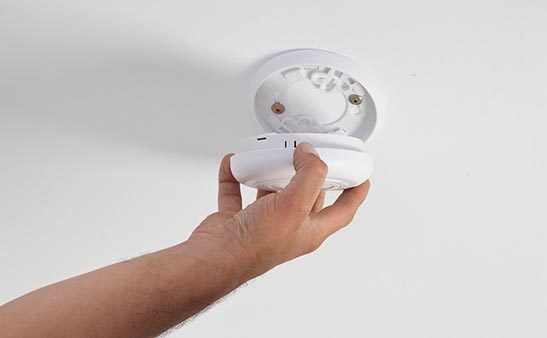Everyone knows about the dangers of fire. That’s why every home and office is required by a new Queensland law to be fitted with interconnected photoelectric fire alarm and smoke detectors, devices designed to keep you, your family, your tenants, and your staff safe. In order for these simple yet effective pieces of technology to function correctly however, it is vital you perform regular tests on them.
Here at BASC services we can not only install devices for you but also offer systematic checking services, audits and certifications to ensure your properties and the people inside are safely complying to our state law.
Firstly, what is the difference between a fire alarm and a smoke detector? Well, as the name suggests, the latter is a device specifically designed to detect smoke. As we all know, smoke is one of the earliest signs of a fire and therefore being alerted to smoke and other harmful gases in the house usually enables people to escape immediately and unscathed. Smoke detectors are easy to install and test at home, with simple external buttons to allow for DIY checks. To some extent fire alarms are much the same as smoke detectors and many have the capacity to detect smoke. Usually found in commercial settings, fire alarms can often be linked to other systems such as sprinklers or local fire stations as soon as there is an alert to danger. They are often more complex and usually unnecessary for domestic dwellings where a fire is most likely to exhibit smoke and therefore be easily identified by a smoke detector.
There are many fire alarms and smoke detectors on the market today. The new Queensland law requires the fitting of photoelectric alarms for homes because they are quicker at detecting smoke and smouldering, two of the most common symptoms of a house fire. Ionisation alarms are quicker at detecting fast-flaming fires so these can be useful in commercial settings or factories but everywhere must be fitted with a photoelectric alarm too. Additionally, carbon monoxide alarms can be an extra defence against gas poisonings and we’d recommend installing one in every house, just to be sure. All alarms and detectors should be powered by the mains so you don’t have to keep remembering to replace the batteries. The Queensland Fire and Emergency Services also recommends a detailed fire evacuation plan being designed and practiced for both your home and office, just in case.
The Queensland law regarding alarms changed on January 1, 2017, requiring all homes to install interconnected smoke detectors throughout all bedrooms and hallways and on every storey of the building. By linking all alarms, the system is able to register a fire anywhere in the dwelling and wake up or alert all residents simultaneously. The law also requires the detectors to be hardwired to your mains power as well as fitted with a back-up power source such as a battery. Whether you’re a homeowner, landlord or business owner, make sure you are complying with the law and taking every measurement possible and necessary to keep people within your properties safe. BASC Services can provide you with a complete checking service and a certificate proving the audit to have been undertaken successfully. If you want your home, property or office to be scrutinised by our expert team, contact BASC Services today.
Remember, when you’re asleep, your sense of smell is greatly reduced. Whilst you may be more than capable of smelling the start of a fire when you’re awake, at night it’s a different story. Smoke detectors and fire alarms save lives. It’s as simple as that. Don’t leave anything to chance and book an appointment with BASC Services today to discuss your fire safety procedure. Different rooms, buildings and layouts require specific fittings so speak to one of our experts to ensure your properties all comply with the new Queensland law.

